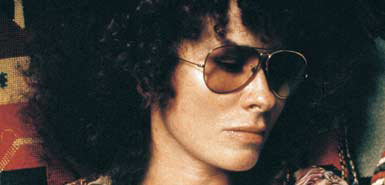Dory Previn died on Valentine’s day. She was 86.
Known mostly for her work on songs for the movies, she also had some success in the pop field with records released in the 70s. She and her first husband, André Previn, were nominated several times for an Academy Award but never won.
Her six records were recorded after her divorce from Previn, her most successful being a live album.
Her songs were intelligent and insightful and most dealt with her personal life, which was a fertile field. Her abusive father was gassed in WWI and suffered severe mood swings which resulted in violent behavior. He deteriorated to the point where he boarded his family up in their home and held them at gunpoint for several months.
She broke into show business as a dancer in the chorus line and then began to sing and write songs. Her contact with Arthur Freed, a noted film producer, landed her a contract at MGM as a lyricist where she started collaborating with Previn. Her husband (a famous jazz pianist) and legendary guitarist Kenny Burrell backed her on her debut album (under the name Dory Langdon) in ’58 and she married Previn the next year.
Her first Oscar nomination was for a song Judy Garland sang in “Pepe” (1960). In ’61 the couple wrote the theme song for “One, Two, Three” and in ’62 they scored another hit with “A Second Chance” for the classic film “Two For The Seesaw” nettng their second Oscar nomination. Other songs they wrote were recorded by Sammy Davis, Jr; Bobby Darin; Doris Day and other big stars of the era. They also collaborated with legend Harold Arlen (“That Ole Black Magic” and other big hits) for “So Long, Big Time!” recorded by Tony Bennet.
Previn’s husband changed careers to conduct classical music, which kept him touring the world. Dory had a phobia about airplanes and couldn’t accompany him. She landed in a psychiatric hospital after a break-down, but later continued to collaborate with André.
She started using the name Dory Previn professionally, and she and André had a hit with Frank Sinatra’s recording of “You’re Gonna Hear From Me.” The couple also wrote five songs for the soundtrack of the classic film “Valley of the Dolls.” Dionne Warwick sang the title tune. Her third Oscar nomination came in 1969 for “Come Saturday Morning” (with composer Fred Karlin) for “The Sterile Cuckoo” — a hit recording for The Sandpipers.
By then, André was finished with film scores and took up residence in London (where he was conducting the London Symphony Orchestra) and also took up an affair with Mia Farrow — who got pregnant. Farrow divorced Frank Sinatra and married André, which landed Dory back in the mental hospital for some shock-therapy (ECT).
She later wrote a song “Beware of Young Girls” inspired by this episode — an unveiled attack on Farrow, who later apologized to Dory in her autobiography.
Some of her other songs tracked her psychotic episodes in the hospital and dealt with issues such as Stockholm Syndrome and fantasies of incest (Freudian echoes of her father’s treatment?).
Most of the people who remember her from the 70s remember “Mythical Kings and Iguanas” (1971). Commercially, her next album “Reflections in a Mud Puddle” was her most successful. Newsweek magazine voted it one of the best albums of 1972. Side two, “Taps, Tremors and Time-Steps: One Last Dance for my Father,” recalls the insane incidents of her childhood and her anguish at dealing with a father he both loved and feared.
Her next album, “Mary C. Brown and the Hollywood Sign” was a concept album with songs intended for a musical revue. The show dealt with a disappointed wannabe actress who commits suicide by jumping off the letter “H” of the famous Hollywood sign (based on the death of Peg Entwistle in 1932). The show was set to open on Broadway was cancelled before it opened due to poor response to the previews.
She continued writing for movies, with her last song being the title theme for “Las Tango In Paris,” and she produced several more albums. She also wrote a screenplay “Third Girl From The Left” (a TV movie) and two autobiographies.
In the 80s, she won two Emmy nominations (and one award) and wrote a play under the name of Dory Previn Shannon (her mother’s maiden name).
She wrote short stories and an unpublished novel as well as teaching lyric writing in various universities. She also collaborated with André on a classical performance piece “The Magic Number” which was performed by the New York Philharmonic with soprano Sylvia McNair.
Her last artistic project was an internet release “Planet Blue” which dealth with environmental threats and issues and was a public domain offering.
She died in Southfield, MA where she lived with her husband, Joby Baker, whom she married in 1984.

Leave a Comment